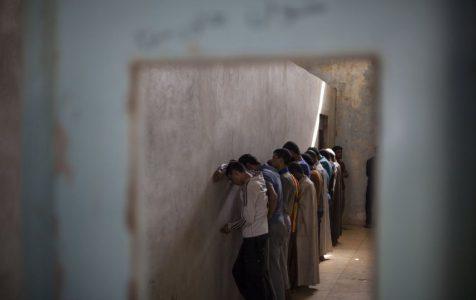
ISIS child suspects arbitrarily arrested and tortured
Iraqi and Kurdistan Regional Government authorities have charged hundreds of children with terrorism for alleged Islamic State (also known as ISIS) affiliation, Human Rights Watch said in a report released today. The prosecutions are often based on dubious accusations and forced confessions obtained through torture.
The 53-page report, “‘Everyone Must Confess’: Abuses against Children Suspected of ISIS Affiliation in Iraq,” shows that Iraqi and KRG authorities often arrest and prosecute children with any perceived connection to ISIS, use torture to coerce confessions, and sentence them to prison in hasty and unfair trials. International law recognizes children recruited by armed groups primarily as victims who should be rehabilitated and reintegrated into society.
“Children accused of affiliation with ISIS are being detained, and often tortured and prosecuted, regardless of their actual level of involvement with the group,” said Jo Becker, children’s rights advocacy director for Human Rights Watch. “This sweeping, punitive approach is not justice, and will create lifelong negative consequences for many of these children.”
Iraqi children who have been arrested for suspected ISIS involvement say that once released, they are afraid to go home because their arrest automatically brands them as ISIS and makes them vulnerable to revenge attacks. Children detained by the KRG said they feared re-arrest by Iraqi federal forces if they return to Baghdad-controlled territory. This stigma can lead to permanent separation from their family and community.
Iraqi and KRG authorities use deeply flawed screening processes that often lead to detention and prosecution of children regardless of whether they have any involvement with ISIS, or the extent of that involvement. A 17-year-old detainee, for example, said he worked at a restaurant in Mosul that served ISIS members, and believed that his name appeared on a “wanted” list because ISIS took his identification so he could be paid.
Others might have the same name as an ISIS suspect. In many cases, neighbors report individuals for ISIS involvement with little or no evidence, or because of personal grievances.
Human Rights Watch estimates that Iraqi and KRG authorities were holding approximately 1,500 children for alleged ISIS affiliation in detention at the end of 2018. At least 185 foreign children have been convicted on terrorism charges and sentenced to prison terms, according to Iraqi government authorities.
In November, Human Rights Watch interviewed 29 individuals who had been detained as children for alleged ISIS association by the KRG, family members of 8 other children who had been arrested by Iraqi authorities as ISIS suspects, child protection advocates, local lawyers, and other legal experts. In 2017, Human Rights Watch visited several detention facilities in Baghdad-controlled territory holding children suspected of ISIS association.
Of the children interviewed who admitted association with ISIS, most said they joined because of economic need, peer or family pressure, or to escape family problems or gain social status. Some said they worked as guards, cooks, or drivers. Others denied any personal involvement, though some said that family members belonged to ISIS. Human Rights Watch was not able to independently verify their possible involvement with ISIS.
Once children are arrested, security forces often torture them into confessing. Nineteen of the 29 boys and young men held by the KRG reported that they had been tortured, including beatings with plastic pipes, electric cables, or rods; electric shocks; and being forced into stress positions. A 17-year-old boy said his interrogators told him, “You need to say you were with ISIS. Even if you weren’t, you need to say it.”
Another 17-year-old boy arrested by Iraqi security forces said he was beaten and repeatedly hung in the air for 10 minutes at a time by his wrists tied behind his back. He said that his interrogators told him that if he denied his confession to the judge, he would be tortured further.
Several children detained by the KRG said that they told a judge that their confession had been coerced through torture, but that the judge appeared to ignore them. Although Iraqi and KRG law require the authorities to provide access to legal counsel to criminal defendants, most of the boys said they did not know whether they had a lawyer, and that their hearings and trials lasted no more than 5 or 10 minutes.
In federal Iraq, children are sometimes detained with adults in severely overcrowded and unsanitary conditions, with no access to education, rehabilitation, or contact with their families. Children held in the Reformatory for Women and Children in Erbil report better conditions, including good food and separation from adult detainees. However, children suspected of ISIS association receive no education, are confined to their rooms for up to 48 hours at a time, and are denied phone calls with their families during pretrial detention. Some also report that reformatory guards beat them for perceived misbehavior.
The Iraqi government and KRG should amend anti-terrorism laws to end the detention and prosecution of children solely for ISIS membership, recognizing that international law prohibits the recruitment of children into armed groups. They should release all children who have not committed other crimes and ensure their rehabilitation and reintegration. Children who may have committed other violent offenses should be treated in accordance with international juvenile justice standards. Authorities should also end all use of torture, investigate those responsible, and hold them accountable.
“Iraq and the KRG’s harsh treatment of children looks more like blind vengeance than justice for ISIS crimes,” Becker said. “Children involved in armed conflicts are entitled to rehabilitation and reintegration, not torture and prison.”
Source: HRW





